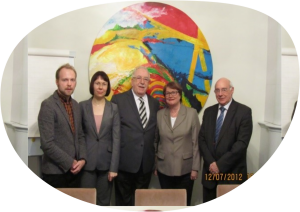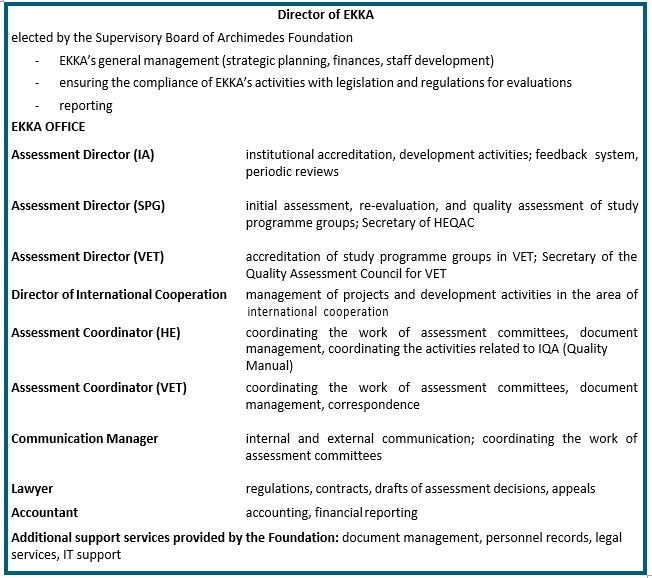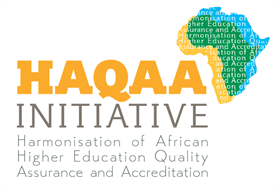Read this in: French
Name of agency: Estonian Quality Agency for Higher and Vocational Education (EKKA)

ENQA review panel visiting EKKA in 2012
Country: Estonia
Name and position of interviewee: Ms Tiia Bach, Assessment Coordinator
Size/description of the higher education system:
In Estonia, the higher education system has two branches: study is carried out in the academic and the professional higher education branch. Since the academic year 2002/03, the general structure of academic study has three levels or cycles: the first level is Bachelor’s study (3-4 years); the second level is Master’s study (1-2 years); and the third and the highest level is Doctoral study (4 years).
Professional higher education is, similarly to Bachelor’s study, the first level of higher education, which ensures access to Master’s study.
In case of medical training, veterinary training, pharmacist training, dentistry training, architectural studies, civil engineering studies and teachers’ training for general teachers, study is based on integrated curricula of Bachelor’s and Master’s study and gives the qualification of the second level of academic higher education.
The study load determined in the curriculum shall be expressed in credit points of European Credit Point Transfer System (ECTS). One credit point corresponds to 26 hours of work used by a student for studying. The study load of one academic year shall be 60 credit points, which is 1,560 hours of work which a student has spent on studying.
Two types of institutions operate: universities and institutions of professional higher education.
In terms of the form of ownership, educational institutions can be state-owned, public and private. (https://www.euroeducation.net/prof/estonco.htm)
As of 2017, there are 20 higher education institutions in Estonia: 6 public and 1 private universities as well as 8 state and 5 private professional higher education institutions. There are 47 800 students altogether.
When was your agency established?
EKKA was established in 2009, although traditions of external quality evaluation of Estonian higher education go back to 1997 when the first study programmes were accredited by the Estonian Higher Education Accreditation Centre that was a separate structural unit of the Archimedes Foundation.
In 1997–2008, the Estonian Higher Education Accreditation Centre organised accreditation of study programmes of all higher education institutions. A positive accreditation decision on a study programme was a mandatory prerequisite for the higher education institution to issue state-recognised graduation documents. Accreditation committees were comprised of experienced foreign experts.
Size of your agency:
EKKA is comprised of the Bureau, which administers and organises EKKA’s work (10 staff members), and two councils: Quality Assessment Council for Higher Education (HEQAC) and Quality Assessment Council for Vocational Education and Training (VET).
Figure 1. Organisational chart of EKKA

Main activities of your agency:
- provides institutional accreditation of higher education institutions;
- provides quality assessment of study programme groups in higher education;
- provides accreditation of study programme groups in vocational education and training;
- conducts expert analyses in order to grant educational institutions the right to conduct studies;
- analyses evaluation results and makes recommendations for improvement to educational institutions;
- informs the general public of the outcomes of evaluations;
- offers training for higher education institutions, VET institutions and evaluation experts;
- participates in international networks and cooperation projects.
What was the purpose of the external review?
The purpose of the review was to evaluate the way in which and to what extent EKKA fulfils the Standards and Guidelines for Quality Assurance in the European Higher Education Area (ESG). Consequently, the review has provided information to the ENQA Board to aid its consideration of whether membership of EKKA should be reconfirmed and to the European Quality Assurance Register for Higher Education (EQAR) to support EKKA application to the register.
How did you organise the preparation of your self-assessment?
The first phase of the self-evaluation was launched already in June 2015 after the new Standards and Guidelines for Quality Assurance in the European Higher Education Area (ESG) were adopted by the Ministers responsible for higher education in the European Higher Education Area. The self-evaluation team consisting of EKKA’s director, lawyer and assessment directors analysed the compliance of current procedures with new standards and developed amendments to the regulations. The second phase was launched in June 2016 in connection with EKKA’s new development plan. Feedback from stakeholders and the achievement of strategic goals was analysed by EKKA self-evaluation team and discussed during the joint meeting of EKKA quality assessment councils in January 2017. As a result, the new development plan for 2017-2022 was approved by the councils.
The entire EKKA self-evaluation process is closely linked with the analysis and plans for the review of the higher education assessment system in Estonia. In the self-evaluation report (https://ekka.archimedes.ee/wp-content/uploads/EKKA_Self-Evaluation_Report_2017.pdf), the SWOT analysis of the system in force and the principles for the review of the system have been outlined. The interim analysis results were discussed with different stakeholders: the department for higher education at the Ministry of Education and Research, Vice Rectors for Academic Affairs of public universities, Estonian Rectors’ Conference of Universities of Applied Sciences, the Estonian Employers’ Confederation, the Management Board of the Federation of Estonian Student Unions, subgroups and steering committee of the Higher Education Act.
What, specifically, would you recommend to other agencies undertaking a self-assessment?
- Follow the guidelines developed for compiling a self-evaluation report
- Be honest and self-critical when analysing your activities
- The process of compiling self-evaluation should, first and foremost, be useful for the Agency itself!
- Agency’s reflection on its activities is an opportunity to connect the writing of the self-evaluation report with reviewing/revising the agency’s own development plan/activities and make necessary changes
- Involve all agency staff members as well as external partners (e.g, representatives of HE institutions, Ministry of Education, etc.) into the process of self-evaluation
- When compiling the self-evaluation report, a well-balanced work-load among staff should be considered
- Take enough time for the self-assessment process and report-writing!
- Inform all external stakeholders, who participate in interviews with the external review panel, about the purpose of the evaluation and possible topics to be discussed during the interview.
What was the most challenging part for you in the review process?
- Compiling the programme of the visit in a way that all important external stakeholders could participate in interviews (most people are very busy and may not be able to come during the time that is allocated for a particular group)
- Different interpretation of some standards of ESG by the Agency and the review panel, e.g., Thematic Analyses
- Ensuring a coherent and easily readable/understandable self-evaluation report with links to all relevant documents, etc.
What was most useful for your agency and what did you learn in the end?
Self-evaluation itself! During the process we discovered quite a few areas where we made immediate improvements and changes before the actual review.


